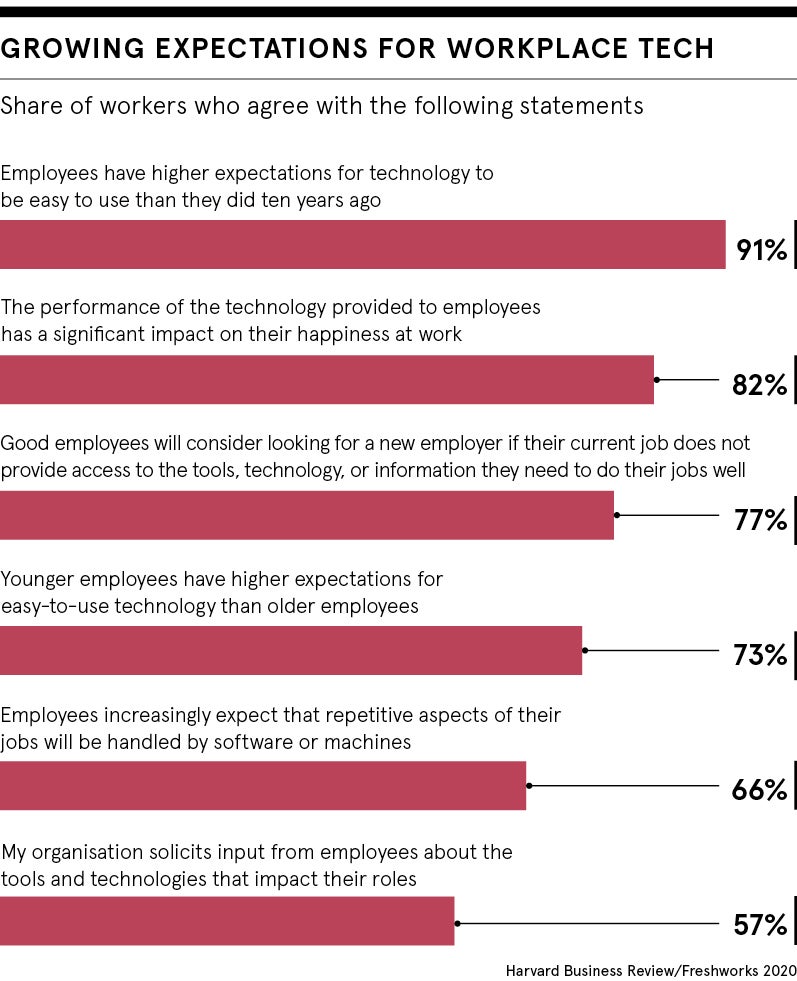
Will it soon be impossible to have a wholly boring job, given the gallop of automation and artificial intelligence? Already, technological capabilities enable workers, across the gamut of business sectors, to relinquish repetitive, menial tasks and use that clawed-back time to focus on more exciting and engaging endeavours.
Perhaps it was a surprise when, in June, a French court ruled that Frédéric Desnard’s former employer, a perfume business, should pay him €40,000 after his mental health deteriorated due to “boreout”, the antithesis of burnout. Under closer inspection, though, Desnard’s unfortunate mismanagement was the result of strict legislation that complicates the redundancy process in France. French employment law needs updating, evidently.
Consider that by 2030 up to one fifth of the global workforce, or 800 million people, will see their jobs replaced by robotic automation, according to an oft-quoted McKinsey & Company report from November 2017.
This headline figure fails to account for all the new, and more exciting, roles that technology will create in the coming decade. The key takeaway for business leaders, though, should be that it is crucial to invest in employees or risk paying a higher price for not evolving boring jobs. Employers that narrow the digital skills gap and help human and machine work side by side will gain a competitive advantage.
Autonomy is critical to interesting jobs
Psychologist Portia Hickey, co-creator of the Smart Collaboration Accelerator, posits the model presented in the mid-1970s by organisational psychologists Greg Oldham and Richard Hackman still remains the blueprint for job design today. “They identified the significance of the job, being able to see the outcome of their work, variety, autonomy and feedback were all key,” she says.
“Jobs are generally becoming more interesting, partly because organisations are more aware of job design, but also because technology can take over highly repetitive, lower-skilled work. However, what makes a job more enjoyable is autonomy.”
The gathering of knowledge allied with autonomy is the perfect combination to motivate workers, according to Karthik Krishnan, chief executive of Britannica Group. “Learning happens when one is stretched outside one’s comfort zone,” he says. “Dopamine is the brain’s reward system and is secreted when accomplishing a challenging task. If the task is too challenging or not challenging enough, negative emotions set in, such as stress, apathy and boredom.”
Krishnan, who lists TikTok content creator, drone operator and driverless car engineer among the most exciting jobs spawned by tech recently, also notes that people’s boredom threshold has never been lower. “The ‘always-on’ mode, the 24/7 information flow and stimulation lead to constant distraction and craving for newness,” he says.
Employers should “design jobs and identify the right talent to be successful”, says Krishnan, adding that it is vital to understand a worker’s ikigai – a Japanese expression that translates loosely as “reason for being” – to keep them engaged and happy.
How tech is improving employee happiness
He says the ultimate goal is to create a culture where employees feel inspired, challenged and empowered. “The good news is that today, technology increasingly performs jobs that are well-defined, regimented and repetitive, thus reducing boring and risky jobs. From taxi drivers to shop workers to soldiers, the range of traditional jobs that will decline or disappear is huge,” says Krishnan.
Research published in September by multinational software company Pegasystems suggests intelligent automation has a critical role to play in crafting a new, tech-enabled, post-pandemic future of work. The global study surveyed more than 3,000 global senior managers and frontline IT staff, and 76 per cent agreed that increased use of tech is improving employee satisfaction, says Pegasystems’ chief technology officer Don Schuerman.
Technology increasingly performs jobs that are well-defined, regimented and repetitive, thus reducing boring and risky jobs
Further, more than half of the surveyed UK businesses (51 per cent) say intelligent automation currently saves them over ten working hours per person a week, freeing up roughly a quarter of their time. And with that available time, the top-three activities are working alongside machines, engaging more with customers and innovating. “What this study makes clear is that technology is one of the top trends shaping the future of work,” says author and futurist Jacob Morgan.
Research presented by robotic process automation (RPA) leader UiPath supports this insight. “Some 35 per cent of UK workers believed that automation would deliver more interesting and creative jobs for future generations,” says Chris Duddridge, UiPath area vice president and managing director in the UK and Ireland. He offers UiPath’s work with Brent Council’s housing benefits departments as an example to highlight how RPA “cuts out the dull parts”.
Making ‘mind-numbing’ tasks history
Before embracing RPA, all rent adjustments had to be uploaded manually on to the system. “It was described as ‘mind numbing’,” says Duddridge. “A single rent change that could take a staff member over four minutes manually now takes fewer than 40 seconds. The council estimates that this automation alone has saved it over £32,000 in the overtime costs needed to ensure deadlines were hit.”
Having the right tech is paramount for workers’ happiness. In a new Freshworks study, some 82 per cent of business leaders around the world acknowledge that how their workplace tech performs is imperative to engage employees. “This is especially true now in the time of home working,” says Arun Mani, president of Freshworks Europe. “Not having the necessary IT services on hand in the same building means businesses need to ensure their technology works and provides a flawless experience for users.”
Alarmingly, the Freshworks research also found 77 per cent of employees will look for a new employer if their current job does not provide the tools, technology or information they need to perform.

It’s not all about tech, though. A balance must be struck and leaders have to understand what motivates individuals. “You have to foster a culture where employees feel comfortable talking about what they need and want,” says Nabila Salem, president at Revolent Group, who recommends holding regular one-to-one meetings.
Organisations unprepared for mass remote working when lockdown was enforced in March are playing catch up in terms of engaging staff, particularly new hires, says Charlie Johnson, founder and chief executive of BrighterBox, a London-based recruitment firm. “A lack of contact time or on-the-fly coaching has left a few joiners feeling lost, unable to ask simple questions,” he says.
Creating the best environment for employee success
Janine Chamberlin, director at LinkedIn, agrees and points to her company’s research that shows 75 per cent of UK C-level executives say workers now expect greater availability and transparency from leaders. “This closer connection is a great way to engage employees, motivate them to achieve their potential and keep them focused on business goals,” she says.
You have to foster a culture where employees feel comfortable talking about what they need and want
“Great employers recognise the importance of change and present opportunities for internal mobility and skills development so employees can benefit from a new experience and progress in their career.”
This chimes with Erica Brescia, chief operating officer of leading software development platform GitHub. “Forward-thinking companies have found new ways to drive employee engagement beyond activities and modes of working that are tied to physical offices,” she says. “They adapt how they operate to support a distributed team, from changing how they communicate to how they track, manage and report on projects.
“They move from highly synchronous ways of working to more asynchronous and collaborative work. And they encourage team camaraderie through virtual activities, such as quizzes, scavenger hunts, cooking classes and happy hours.”
Looking ahead, Brescia concludes: “The new future of work is not dependent on office locations or physical workspaces, but rather on adapting to new ways of getting work done to provide employees with the best environment for their success.”

Will it soon be impossible to have a wholly boring job, given the gallop of automation and artificial intelligence? Already, technological capabilities enable workers, across the gamut of business sectors, to relinquish repetitive, menial tasks and use that clawed-back time to focus on more exciting and engaging endeavours.
Perhaps it was a surprise when, in June, a French court ruled that Frédéric Desnard’s former employer, a perfume business, should pay him €40,000 after his mental health deteriorated due to “boreout”, the antithesis of burnout. Under closer inspection, though, Desnard’s unfortunate mismanagement was the result of strict legislation that complicates the redundancy process in France. French employment law needs updating, evidently.
